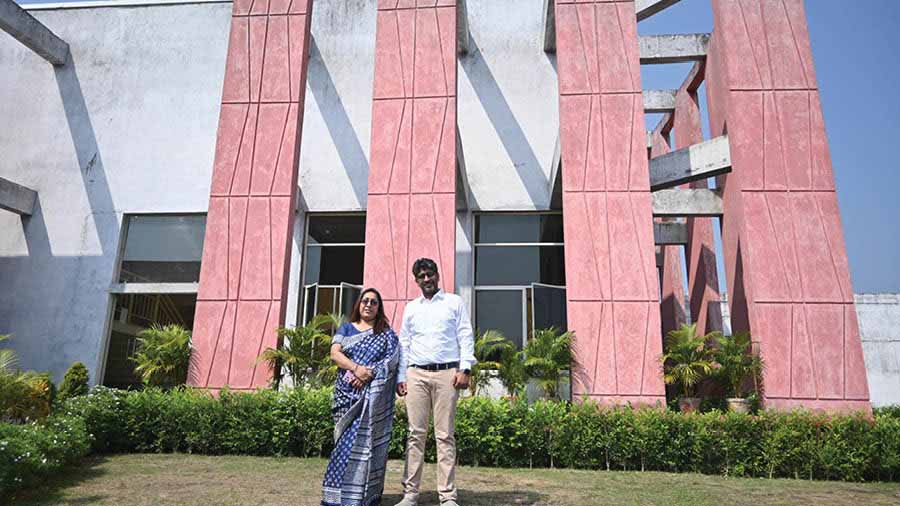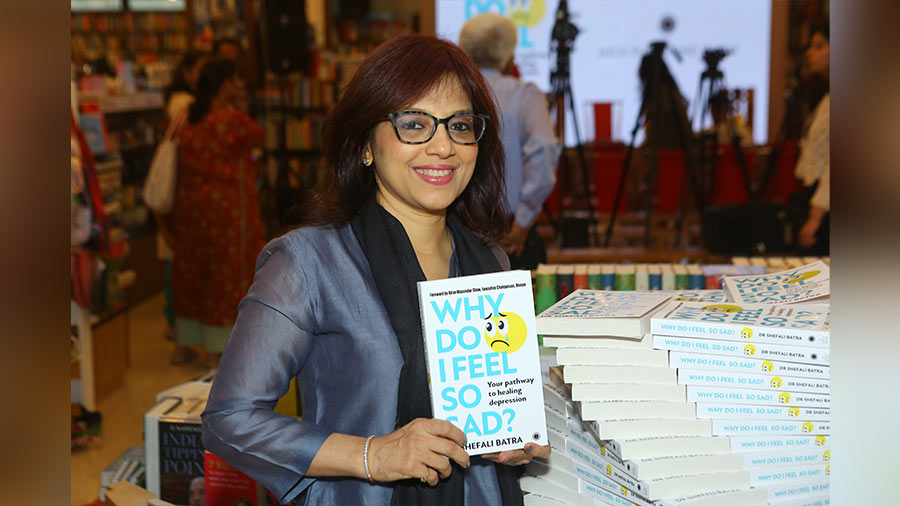In just a year, Priyanka Agarwal and Vishal Gupta have managed to change 50 lives.
Addiction is a condition that is often overlooked. It can wither away the lives of not just the people affected but everyone around them.
An hour away from Howrah station, two siblings have set up a rehabilitation centre that aims to cure addiction with a humane approach. My Kolkata spent an afternoon at the sprawling Rekindle Wellness Centre, getting acquainted with its mission to provide the best psychiatric care in eastern India.
Fulfilling a dream
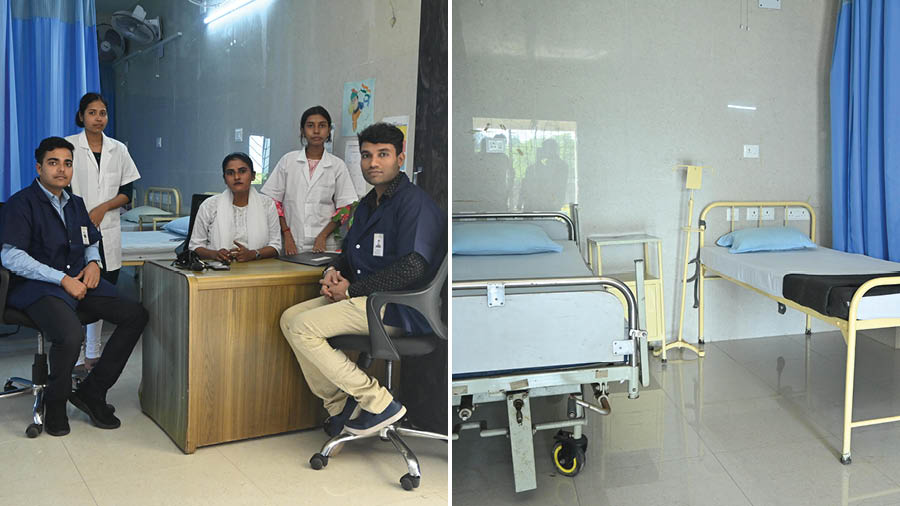
Rekindle has a fully equipped 10 bed with doctors present 24x7
Vishal Gupta and Priyanka Agarwal grew up in a huge joint family in Howrah. Despite having relatives who were highly qualified doctors and civil servants, they were encouraged to read and play sports without a care in the world. In 1991, their father set up the now-defunct Gupta Nursing Home in Howrah. Their elder brother is also a practising ophthalmologist, so the two were always closely linked to the medical world. “Papa always wanted to work in psychiatry but was limited by his knowledge at the time. Years later, when I was working for an MNC in Australia, I visited The Sanctuary Byron Bay, regarded as one of the best psychiatric centres there. I had never seen something like this back home and decided to bring this model to India,” Vishal said.
Homecoming
After consulting doctors, Vishal decided that it would be best to set up the facility in Mumbai as the city had greater awareness. Thus was born Sunshine Wellness Centre in 2011. “Thankfully, Papa was with us then and he could see it.” But Vishal wasn’t done.
Ever since he moved back to India, his ultimate goal had been to start a rehabilitation centre in his hometown. Conversations with experts made him realise that it would be a steep task. This is where Priyanka stepped in. “We realised that there were barely any rehab centres in eastern India. Even the ones that existed weren’t in good condition, treating people worse than animals. How do you expect parents to take their sick child to a rehab in Pune? And how many parents can afford to visit them regularly? Bengal has terrible addiction problems and nowhere to go,” she sighed.
With the help of Priyanka’s husband, they identified a suitable plot of land spread over 2.5 acres. In 2019, Vishal passed over the responsibilities of Sunshine in Mumbai and moved back to Howrah to begin their dream project. The challenges had only begun.
Overcoming the Covid challenge
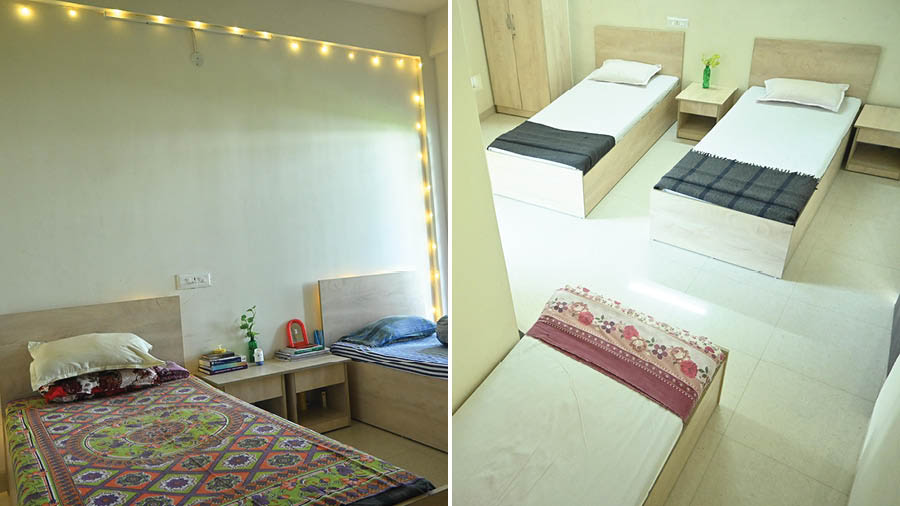
The simple single, double and triple sharing rooms are designed to provide ample sunlight, while keeping the inhabitants safe with no sharp edges, ceiling fans or internal locks
Priyanka and Vishal purchased all the materials for construction and hired labour. They were scheduled to complete the project in two years, when Covid struck. The banks immediately withdrew their support. “For over a year, we had to stop the construction, during which our labourers also left. We went back to the site and saw that our materials had been stolen. Costs had escalated because of the pandemic. After investing a huge amount without a finishing line in sight, we contemplated cutting our losses and abandoning the project,” Priyanka recounted. At that crucial juncture, friends and family came to the rescue, pooling in their own finances. “Things were going berserk but Vishal single-handedly planned and executed everything.”
Finally, Rekindle Wellness Centre could open its doors in Howrah on November 6, 2022. The simple single, double- and triple-sharing rooms at the facility are designed to provide ample sunlight, while keeping the inhabitants safe with no sharp edges, ceiling fans or internal locks.
Being mindful
Vishal brought with him all his learnings from Sunshine while conceiving Rekindle. He started with the basics, keeping a singular point for entering and exiting the 27,000sqft facility. This was done to ensure that patients had no way to run away, which is a common occurrence in most rehabs.
The duo also understood how sensitive this situation was for families, and introduced a patient pick-up service with legal authorisation and complete support from both the family and the police. “Since patients can often be reluctant and get violent, we also organise pick-ups at discreet hours to prevent a scene in the neighbourhood,” Priyanka said.
Vishal and Priyanka want the transition from home to rehab to be as seamless as possible. Hence, the first thought on entering the facility is the calmness of the environment. Many walls inside are covered with art and craft projects made by patients. Their agency extends beyond this, with patients even making a thermocol fountain outside the facility and caring for many of the plants in the extensive garden. “We wanted the facility to feel open so that our patients don’t feel like they are being caged. Every nook and corner at Rekindle gets abundant natural light,” Vishal said.
The games room, table tennis room and central atrium are designed to help patients bond in a fun and interactive way.
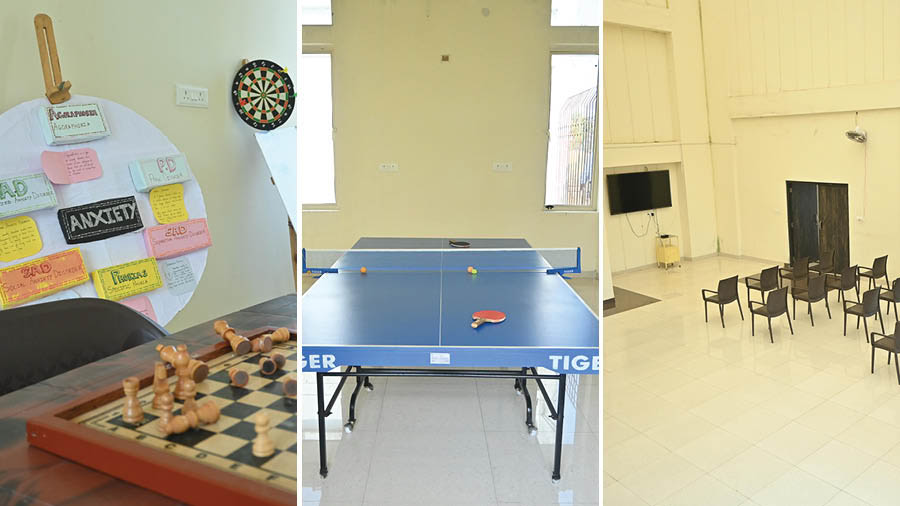
The games room, table tennis room and central atrium are designed to help patients bond in a fun and interactive way
Besides this, there is a comprehensive ICU section with 10 beds and 24x7 doctor support, equipped to handle all emergencies. There are also separate female doctors and security staff. Patients undergo a proper check-up upon admission.
Security of patients is paramount. In order to eliminate risks of suicide or self-harm, edges of all walls have been smoothened, and the rooms have no ceiling fans. The windows are made of toughened glass, and patients cannot lock themselves from the inside.
Creating a liveable space
Absence of routine often lends to addiction. Rekindle’s central focus is on bringing back routine. “They might start drinking early in the morning and spend all day watching TV alone in their rooms. The patients needs to have their day regimented, with designated hours for everything. This is only possible in rehab,” Priyanka said.
To reinforce this, the routine has been meticulously structured. Every day begins at 6.45am with a morning walk, followed by tea and biscuits. The idea is to start the day with nature and sunlight. After this, there is a puja in the temple with refreshments. After this, patients then have an hour-long session of yoga, and 45 minutes of meditation. The first half is packed with several art and craft activities, group discussions, counselling sessions and doctor consultations. After lunch, patients get some time to rest, followed by two more activity sessions. People have access to an expansive library and a music room to explore their creative side. On most evenings, the patients gather on the ground to play cricket or football with the staff members. Vishal admitted that this is his favourite part of the day. They finally end the day at 6pm with another puja.
Treatment begins with psychological lessons so that patients can understand their illness. At Rekindle, doctors, social workers, and psychologists work together to analyse every patient’s limitations and design activities for their skill, behaviour and cognitive development. “For example, patients who can’t deal with stress are asked to complete tasks under a deadline to simulate stress. The treatment evolves with the patient’s progress,” Vishal explained. Similarly, the recreational activities are also updated when new patients join, to cater to everyone’s hobbies.
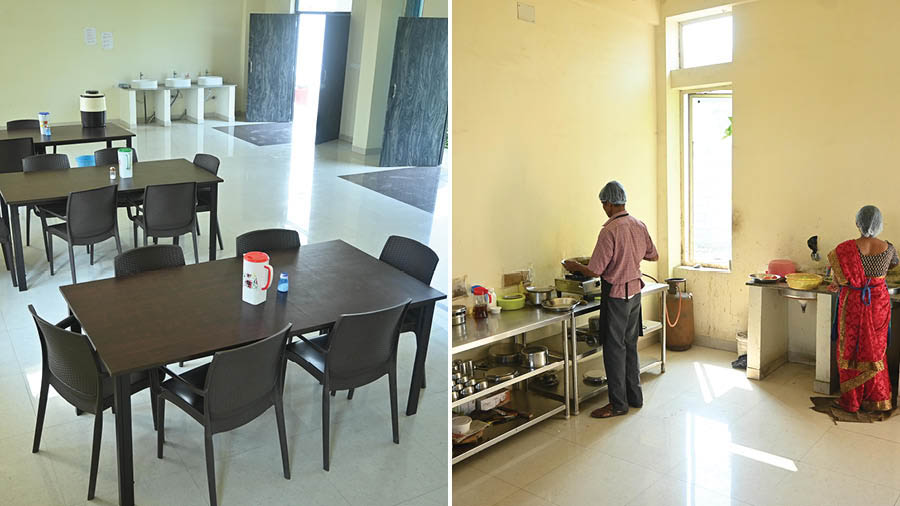
Healthy meals are served in the dining room
Collaboration extends to the central atrium, which is designed as a common room where patients can interact and spend their free time together. It hosts stimulating group discussions, where they debate on complex topics. “A moral always awaits them at the end of the debate. The group discussions help learning to seep much deeper, as opposed to moral lectures. We believe in experiential learning,” Vishal explained.
Healthy meals are served in the dining room
The living quarters also reinforce this, with most patients inhabiting double- and triple-sharing rooms, which are separate for male and female patients. Rekindle also provides single rooms for those who prefer privacy. “We have not installed TVs in the rooms either to prevent patients from isolating themselves. It is very heartening to see their bond, with people from AC rooms often inviting their friends from non-AC rooms to rest in their quarters during summer,” added Vishal. Rekindle also has a series of luxurious single-occupancy cottages for its more exclusive clientele.
Invisible barriers
Public perception is as big a problem as addiction. “Movies have played a major role in spreading lies, showing how rehab patients are often tied up, beaten up, or administered electric shock. These aren’t true but because of them, people don’t want to admit their family members to rehab. Even doctors are apprehensive to recommend it, fearing that the patient may stop visiting them,” Priyanka said. Almost every problem has addiction issues. “We just don’t get to see them until things reach a breaking point. No one decides to kill themselves in one day, there is an ongoing chemical imbalance affecting their mind,” she said.
Children from difficult families are especially susceptible to this disease and treating it is even more difficult in rural and semi-urban settings because there is huge stigma. “There, people are locked up in the house. Wahan treatment nahin hoti,, tantrik ko bulake bhoot bhagaya jaata hai,” Priyanka said. Vishal cited examples from technical papers to state that early detection and treatment are the only remedy to addiction.
Vishal explained that rehabilitation is a long process, which most people don’t understand. “The first month is spent in patients resisting and they are in a complete state of denial. You will hear them say things like, ‘I can stop when I want’, ‘It’s just one drink’ and ‘I only do it for recreation.’ After that, patients cite their month-long sobriety as an example of being okay and trying to get out of treatment. After two months, the family gets jittery and wants to take them out. The patients also start complaining about the rehab in order to convince the family. They sometimes emotionally blackmail the family too,” Vishal said.
The idea is to help the patient through the first three months of transition, before things gradually start getting better. Priyanka added that there is also an unwillingness to take medication long term, with many families trying to self-medicate. “If you take medicine for your heart or blood pressure every day, why not this?”
While building Rekindle, Vishal and Priyanka visited many rehabs around eastern India and were appalled to see the low standards, with most merely acting as ‘de-addiction facilities’. “They keep the person in a confined room so that there is abstinence but their counsellors aren’t always qualified. In many cases, former addicts are the ones counselling. Most facilities within the city don’t have the luxury of space and are confined to a building or flat, making it difficult to keep the person for a few months,” Vishal explained.
While the fear of going back to a bad rehab does sometimes work in preventing relapse, the person generally goes back to drugs the moment they leave.
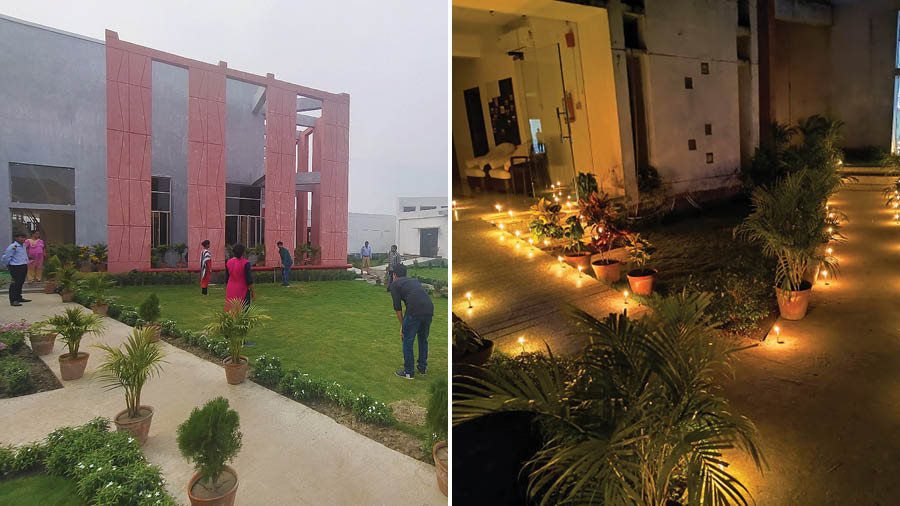
Rekindle prides itself on its humane touch. (L-R) Patients and staff come together to play cricket every evening, and celebrate every festival
“At Rekindle, we only follow psychiatry and medical science. Our focus is on getting patients to a place where, when they leave the facility, they can rehabilitate within society.” To facilitate this, Rekindle encourages families to regularly visit patients so that they don’t feel abandoned. When patients seem to be making good progress, Rekindle also takes the family’s consent to take them out for occasional drives with security. “We’ve recently been sending one of our patients home for a week every month. Not only were the parents more comfortable to see the work he had put into his weaknesses but we could also observe how he was assimilating within the outside world,” said Vishal.
The bad days significantly outweigh the good ones. “This isn’t a result-oriented field. It has a lot of failures. Irrespective of the treatment, the global success rate for addiction is only 8 per cent,” Vishal said. However, he feels that this shouldn’t be a reason to deny treatment. “Just because the treatment may not be fully successful, should we not even try to treat the person? For them, waking up in the morning and reading a newspaper while drinking tea like the rest of us is luxury. They need help,” said Priyanka. Because of the high probability of a relapse, Rekindle also counsels family members on the warning signs, and how to respond.
Over the past year, the facility has treated approximately 50 people, with largely positive results. They are equipped to handle 100 patients at full capacity, giving everyone personalised attention. “We need money to run such a big facility but we don’t want this to only be about profit. The hallmark of our facility is the humane touch, be it in the biryani we sometimes prepare for patients or in the way we celebrate every festival here. Our core intention is to provide good treatment,” Priyanka smiled.
Vishal added, “It’s not been easy, we’ve incurred huge losses. But you have to meet the parents of our patients to understand what keeps us going. When they thank us, it gives us unparalleled satisfaction.”
You can find more information at www.rekindlewellness.com. You can also write to info@rekindlewellness.com or contact them at +91 98333 04241/98362 22283.
